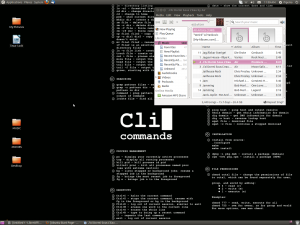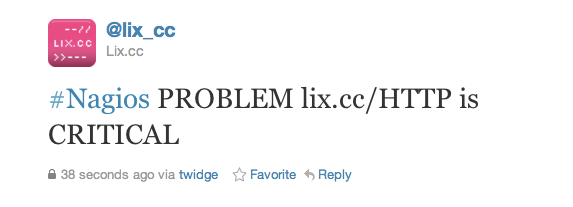The looks
 In the past week I practically bullied all my friends into reading the first post about the Linux experience and to my surprise, it did trigger a certain wonder in the non-nerd community that I know. The biggest curiosity had to do with its looks. I felt like trying to describe someone for a blind date… “Is not so boring! Seriously, it looks really good”, “No, I know you are not a computer person but I’m telling you, it changed its appearance completely and it looks amazing now”. This was actually the thing I was most surprised about when I first interacted with my Ubuntu interface, cause it’s really intuitive and friendly to the eye. Almost all of its software has a resemblance to one that we are familiar with already (Libre Office to Word, Banshee to iTunes, GIMP to Photoshop and so on). Most people think of Linux in the same way I did: is not for me cause I’m an “average” user, it’s the OS for programmers. That may have been the case some years ago, but now even a blond girl (hey that’s me!) can find her way around it without feeling hopeless or lost in an unfamiliar environment. However, the success of a blind date doesn’t have to do only with looks, because the important things usually transcend the limits of what’s visible to the eye. The open nature of this operating system makes all the difference in the world, and even if we are not familiar with the technicalities of it, even if we don’t understand how Linux is better than other OS because on the surface it “looks” the same and we are not particularly turned on by the cleanliness of the processes running in the back-end, we should try to be aware of the social and political implications of our daily choices and own those choices rather than let others decide for us.
In the past week I practically bullied all my friends into reading the first post about the Linux experience and to my surprise, it did trigger a certain wonder in the non-nerd community that I know. The biggest curiosity had to do with its looks. I felt like trying to describe someone for a blind date… “Is not so boring! Seriously, it looks really good”, “No, I know you are not a computer person but I’m telling you, it changed its appearance completely and it looks amazing now”. This was actually the thing I was most surprised about when I first interacted with my Ubuntu interface, cause it’s really intuitive and friendly to the eye. Almost all of its software has a resemblance to one that we are familiar with already (Libre Office to Word, Banshee to iTunes, GIMP to Photoshop and so on). Most people think of Linux in the same way I did: is not for me cause I’m an “average” user, it’s the OS for programmers. That may have been the case some years ago, but now even a blond girl (hey that’s me!) can find her way around it without feeling hopeless or lost in an unfamiliar environment. However, the success of a blind date doesn’t have to do only with looks, because the important things usually transcend the limits of what’s visible to the eye. The open nature of this operating system makes all the difference in the world, and even if we are not familiar with the technicalities of it, even if we don’t understand how Linux is better than other OS because on the surface it “looks” the same and we are not particularly turned on by the cleanliness of the processes running in the back-end, we should try to be aware of the social and political implications of our daily choices and own those choices rather than let others decide for us.
 It all started as a discussion on security. I’ve never considered this an issue of importance before, even as an avid computer user. But it was made clear to me that the world is changing and apparently not in the “right” direction. Eager to get out of my shell of microsoftian comfort, I decided to try GNU/Linux, when Lx kindly offered to install it for me. He guided me through the process like the patient “older brother” (note that I purposely didn’t use “big brother”) teaching the younger sister how to ride a bike. Which is why my old windows OS was kept intact in a different hard drive. Kind of giving me a “safety” feeling, like those little wheels on kid’s bikes. I needed the reassurance that my computer world as I knew it, was still going to be available for me, two clicks away. It wasn’t difficult to get on the road of open software this way. And the curious thing is that I haven’t accessed my “little wheels” (the windows hard drive) ever since I got the new one cause I don’t seem to need it. I can ride smoothly on the GNU/Linux and it has that “cool toy” aura to it. But it is important that I could do everything I needed to, and remarked that some things work even better now! (like video chatting and the general performance of my computer). So far, I don’t miss anything (beyond some unimportant shortcut and some spanish character) and I’m overall quite happy with the change. I had prejudices, like most people, because we tend to think that things are to be valued by their price, rather than by their nature. Like most people, I too thought that open software “can’t” offer enough because it’s free. As if there was an intrinsic correlation between high price and high quality. Reality dictates this is a fallacy that we choose to ignore.
It all started as a discussion on security. I’ve never considered this an issue of importance before, even as an avid computer user. But it was made clear to me that the world is changing and apparently not in the “right” direction. Eager to get out of my shell of microsoftian comfort, I decided to try GNU/Linux, when Lx kindly offered to install it for me. He guided me through the process like the patient “older brother” (note that I purposely didn’t use “big brother”) teaching the younger sister how to ride a bike. Which is why my old windows OS was kept intact in a different hard drive. Kind of giving me a “safety” feeling, like those little wheels on kid’s bikes. I needed the reassurance that my computer world as I knew it, was still going to be available for me, two clicks away. It wasn’t difficult to get on the road of open software this way. And the curious thing is that I haven’t accessed my “little wheels” (the windows hard drive) ever since I got the new one cause I don’t seem to need it. I can ride smoothly on the GNU/Linux and it has that “cool toy” aura to it. But it is important that I could do everything I needed to, and remarked that some things work even better now! (like video chatting and the general performance of my computer). So far, I don’t miss anything (beyond some unimportant shortcut and some spanish character) and I’m overall quite happy with the change. I had prejudices, like most people, because we tend to think that things are to be valued by their price, rather than by their nature. Like most people, I too thought that open software “can’t” offer enough because it’s free. As if there was an intrinsic correlation between high price and high quality. Reality dictates this is a fallacy that we choose to ignore.





